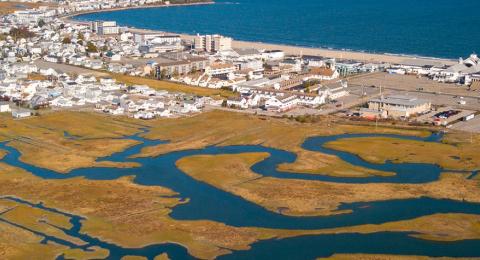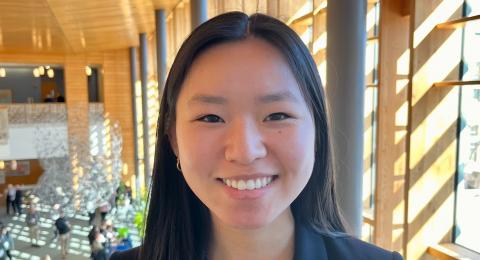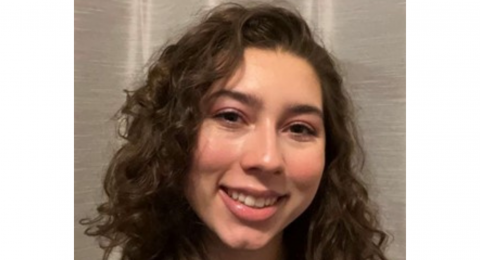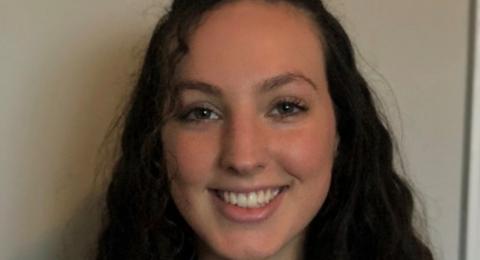60+
Hours per student spent engaged in experiential learning each semester
100%
Hands-on learning
SIMAP
UNH hosted carbon and nitrogen tracking tool
The Climate Action Clinic spring 2026 application is OPEN!
Apply by:
Priority: November 15
Final: December 2
Please see the FAQ section for all details and application instructions and link.
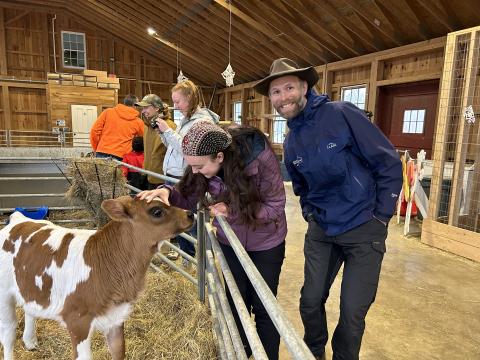
Climate Action Clinic students were invited to tour their client's facility, Wolfe's Neck Center.
What is the Climate Action Clinic?
The Climate Action Clinic is an exciting opportunity for you to gain expertise and experience in sought-after environmental reporting skills by working on a team to learn how to complete a carbon footprint analysis for a leading regional business, nonprofit or community. The Clinic uses the Sustainability Institute’s expertise and investment in the Sustainability Indicator Management and Analysis Platform (SIMAP), an online platform used by more than 500 organizations worldwide to understand, communicate, and manage their carbon and nitrogen footprints. The Clinic is designed to give you the skills organizations are looking for, while helping organizations with their emissions reductions.
Get all the details and application instructions in the FAQ sections below.
Questions? Contact Jennifer.Andrews@unh.edu
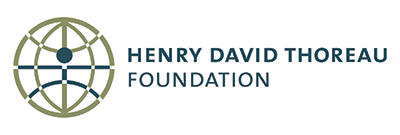
We are grateful to the Henry David Thoreau Foundation for their generous support of this program.
STUDENTS
- Spring Participation Application Deadlines:
Priority: Nov. 15, Final: Dec. 2 - Appy here
QUESTIONS? Contact Jennifer.Andrews@unh.edu
Are you with a company looking to participate?
Learn more about the program and how to apply to participate as a client:
Learn more about the Clinic for Clients
FAQs, Participation Expectations & Application Instructions
The work and scope of projects vary from each group and client company.
The commitment to course logistics is like any class at UNH, with a 1 hour, 20-minute course session that meets weekly. There is a weekly meeting with the assigned client during business hours (M-F 9am- 5pm) and a weekly meeting with your group (i.e., 3.5 hours of meetings weekly).
Work completed for your client shouldn’t exceed 1-3 hours per week.
We also hold two in-person events per semester with the participating clients:
- Client Kick-off: Clients present their organization and goals for the semester to the student consultant teams.
- Final Presentation Showcase: Each team shares their completed work and the lessons they learned from the Clinic in a 10-minute presentation to clients, UNH faculty and staff, family and friends, followed by time for networking.
While experience is a plus, it is certainly not a requirement.
A commitment to change and contributing to sustainability will make your Clinic experience successful! We’ll give a thorough introduction to carbon footprinting before you begin working with your client, allowing you to ease into the consulting process.
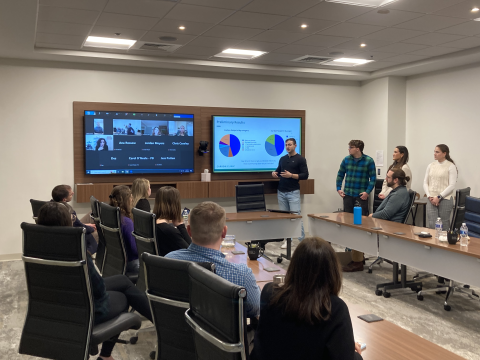
We match students with clients based on preference and team workability. Our goal is for you to get your first or second choice.
Student team sizes range from 2-4 student consultants and each team is led by a Peer Mentor with additional support from a Graduate Student Advisor. The Peer Mentor is a student who serves as the group lead and chief student consultant – they’ve completed the Clinic in a previous semester, so are a great resource for you. The Graduate Advisor is your main resource after your peer mentor to answer more complex questions about your data set, another great resource for you to succeed.
You’ll gain many employable skills and get real-world experience – a great resume builder! From consulting experience, team building, responsibility for deliverables, communication and organizational skills, to a greater understanding of carbon footprints and emissions reductions efforts.
You’ll also gain an understanding of what it’s like to work on a team of people from different academic backgrounds and have the chance to network with local leaders.
Upon completion of this course, you'll be able to:
- Understand the benefits and uses, as well as the limitations and challenges, of entity-level greenhouse gas accounting, and be able to critically assess the fundamental underpinnings of organizational carbon reduction goals and carbon neutrality claims
- Understand and be able to apply the standard protocols and core concepts of greenhouse gas accounting to contribute to corporate transparency and accountability, stakeholder engagement, and business planning
- Understand how carbon management practices manifest across a wide range of industries, and be able to apply these concepts to critically analyze individual companies in terms of their carbon management practices.
No, you do not need to be a PAUL student and we encourage students of ALL majors and backgrounds to apply! We strive to create interdisciplinary student teams to bring a wide range of knowledge and perspectives to the experience.
Yes! This is a 2-credit course for ALL majors.
It also satisfies:
- 670 B.I.P. credit for PAUL business students
- An elective credit for the Sustainability Dual Major
Please note for participants who repeat the class: the Clinic can only be used to satisfy major requirements once; however, it can be repeated for general credit.
I’ve also heard about the B Impact Clinic. Can I take both?
Yes, however students are not allowed to take both Clinics in the same semester due to the nature of the Clinics and time conflicts that will arise.
Thank you for your interest in the Climate Action Clinic!
Questions? Contact Jennifer.Andrews@unh.edu
The Clinic has limited seats each semester. Because you'll be working with community organizations, we ask that you apply for the Clinic so we can understand your experience, interests and make the best matches. After you apply, we'll reach out to schedule a meeting with you to get to know you better, and then we offer seats to most applicants. If we have many more applicants than seats, we will refer to our waitlist if seats become available.
Spring 2026 application due dates:
Priority: November 15
Final: December 2
Application instructions:
Before applying, please be sure to read all the FAQs and Participation Expectations sections above.
When completing the online application, please read all instructions carefully! Here's what you can expect:
- In the first section of the online application form, you’ll complete information about yourself (contact, major, grad year, etc.)
- Be sure to select “Climate Action Clinic” when asked “What program are you applying for?”
- In the next section, you will be asked some additional questions, and then asked to download the “Additional Application Materials Document”. This document has questions about your interest, goals and involvement on campus. After downloading, you will type your answers in the document and save the file as a Word document or a PDF.
- Name your document as follows: First Name_Last Name_CAClinic
- Then, you will upload your saved document back to the online form where asked to do so, and complete the remainder of the online form - be sure to hit "Submit" to complete your application.
- We will contact you by email to schedule a conversation.
